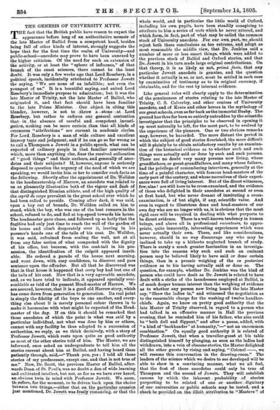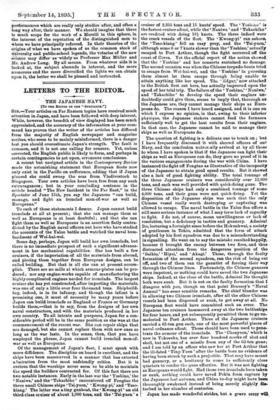THE GENESIS OF UNIVERSITY MYTH.
THE fact that the British public have reason to expect the appearance before long of an authoritative memoir of the late Master of Balliol from a competent hand, besides being full of other kinds of interest, strongly suggests the hope that for the first time the realm of University—and public-school—anecdote may prove to have been annexed by the higher criticism. Of the need for such an extension of the activity, or at least the " sphere of influence," of that branch of the exact sciences, there cannot be the least doubt. It was only a few weeks ago that Lord Rosebery, in a political speech, incidentally attributed to Professor Jowett the saying, "We are none of us infallible; not even the youngest of us." It is a beautiful saying, and suited Lord Rosebery's immediate purpose to admiration; but it was the late Master of Trinity, not the late Master of Balliol, who originated it, and that fact should have been familiar to the late Prime Minister. Our object in citing this blander, however, is not to -throw a . stone at Lord Rosebery, but rather to enforce our general contention that in the absence of careful and competent investi- gation, nothing can be more certain than that all kinds of erroneous " attributions " are current in academic circles. For Lord Rosebery is a man of wide culture and excellent literary taste and judgment, and if he can go so far wrong as to call a Thompson a Jowett in a public speech, what can be expected of ordinary people in that familiar conversation which, more than anything else, fixes the received collocation of good things " and their authors, and generally of anec- dotes and their subjects P If, however, anyone is seriously disposed to question the urgency of the need of which we are speaking, we would invite him or her to consider such facts as the following. Shortly after the appointment of Dr. Welldon to the headmastership of Harrow, an anecdote was related to us as pleasantly illustrative both of the vigour and dash of that distinguished Etonian athlete, and of the high quality of the esprit de corps prevalent in the great school over which he had been called to preside. Coming after dark, it was said, upon a boy out of bounds, Dr. Welldon called on him to stand, which the boy, who was one of the best runners in the school, refused to do, and fled at top-speed towards his house. The headmaster gave chase, and followed up so hotly that the fugitive had only just time to reach the wall of the garden of his house and climb desperately over it, leaving in his pursuer's hands one of the tails of his coat. Dr. Welldon, it was said, refrained from scaling the wall, not at all from any false notion of what comported with the dignity of his office, but because, with the coat-tail in his pos- session, the identification of the culprit appeared inevit- able. He ordered a parade of the house next morning. and went down, with easy confidence, to discover and pass sentence upon the offender. But all that he discovered was that in that house it happened that every boy had lost one of the tails of his coat. Now that is a very agreeable anecdote, and, as we have tried to indicate, it appeared specially vrai, semblable as told of the present Head-master of Harrow. We are assured, however, that it is a good old Harrow story, which has come down from generation to generation. Its real point is simply the fidelity of the boys to one another, and every- thing else about it is merely personal colour thrown in to make it harmonise with what might be expected of the Head- master of the day. If on this it should be remarked that those anecdotes of which the point is what was said by a particular individual, not what was done by him or others, cannot with any facility be thus adapted to a succession of authorities, we reply, as we think decisively, with a story of Professor Jowett, which rests upon quite as good authority as most of the other stories told of him. The Master, we are informed, once asked an undergraduate to tell him all the stories current about him at Balliol, and having heard them patiently through, said,—" Thank you, yes ; I told all those stories of my predecessor, except one, and that is not true of me." Now, Dr. Scott, the previous Master of Balliol, after- wards Dean of St. Paul's, was no doubt a don of wide learning and cultivated intellect, but not, so far as we have ever heard, an obvious twin in mind with Professor Jowett. We seem, th, refore, for the moment, to be driven back upon the choice between two things,—either that on the particular occasion just mentioned, Dr. Jowett was freely romancing, or that the whole world, and in particular the little world of Oxford, including his own pupils, have been steadily conspiring to attribute to him a series of mots which he never uttered, and which form, in fact, part of what may be called the common stock of University anecdote. For our own, part, we Aould reject both these conclusions as too extreme, and adopt as most reasonable the middle view, that Dr. Jenkins said a number of more or less smart things, which were added to
previous stock of Balliol and Oxford stories, and that Dr. Jowett in his turn made large original contributions. On that theory, it is as likely as not, prima facie, that any particular Jowett anecdote is genuine, and the question whether it actually is so, or not, must be settled in each case by examination of testimony as to its original currency, if obtainable, and for the rest by internal evidence.
Like general rules will clearly apply to the determination of the genuineness of stories relating to the late Master of Trinity, C. S. Calverley, and other centres of University anecdote, and of Keate and other heroes in the mythology of our great schools, even as far back as the immortal Busby. The ground has thus far been so entirely untrodden by the scientific investigator that the principles to be observed in opening it up must naturally be left, for the most part, to be evolved by the experience of the pioneers. One or two obvious remarks may, however, be hazarded. The more distant the period in which the subject of good stories flourished, the more difficult will it plainly be to obtain satisfactory results by an examina- tion of the historical evidence as to whether such and such things were actually said or done by such and such persons. There are no doubt very many persons now living, whose grandfathers, or great-grandfathers, and many whose fathers, had the privilege of remembering interviews, generally at the time of a painful character, with famous head-masters of the early part of the century, and whose narratives of their experi- ences were full of living interest. But of the direct witnesses,, few, alas ! are still here to be cross-examined, and the evidence of those who delighted in their anecdotes at second or even at first hand, but who never dreamt of instituting a cross- examination, is of but slight, if any, scientific value. And even in regard to illustrious dons and head-masters of our own day who are no longer with us, it is obvious that the moat rigid care will be required in dealing with what purports to. be direct evidence. There is a well-known tendency in human beings, and above all in professional raconteurs, to appro- priate, quite innocently, interesting experiences which were never actually their own. These, and like considerations, however, should in no way discourage any who may be inclined to take up a hitherto neglected branch of study. There is surely a much greater fascination in an investiga- tion into the reasons why such and such an eminent person may be believed likely to have said or done certain things, than in a prosaic weighing of the ex posteriori evidence as to his having actually said or done so. The question, for example, whether Dr. Jenkins was the kind of person who could have dealt as Dr. Jowett is related to have dealt with a strike of the laundresses employed at Balliol, is of much deeper human interest than the weighing of evidence as to whether any person now living heard the late Master say, "Show the ladies in," and witnessed the negotiation as to the reasonable charge for the washing of twelve handker- chiefs. Again, we know on pretty good authority that the late Master of Trinity observed, in regard to a person who had talked in an offensive manner in Hall the previous evening, that he reminded him of his father, who also could be " both dull and flippant," and after a pause, added, with " a kind of backhander' at humanity,"—" not an uncommon combination." On equally good authority it is related of Professor Jowett, that when a traveller-guest at his table distinguished himself by plunging, as soon as the ladies had withdrawn, into a vein of obscene stories, the Master delighted all the other guests by rising and saying, " Colonel —, we will resume this conversation in the drawing-room." The leaders of the science which we desire to see developed will be able to show in a convincing manner, what we all feel, that the first of these anecdotes could only be true of Thompson and the second of Jowett. They will establish canons by which the inherent probability of stories purporting to be related of one or another dignitary of our universities or public schools may be tested, and a check be provided on the illicit. attribution to "Masters" of performances which are really only studies after, and often a long way after, their manner. We should imagine that there is much scope for the work of a Morelli in this sphere, in the interest of the repntation of the distinguished men to whom we have principally referred. In their theories of the origins of what we have spoken of as the common stock of university and public-school legends, the votaries of the new science may differ as-widely as Professor Max Muller and Mr. Andrew Lang. By all means. From whatever side it is looked at, the subject abounds in interest, and the more numerous and the more diversified the lights we can obtain upon it, the better we shall be pleased and instructed.



































 Previous page
Previous page